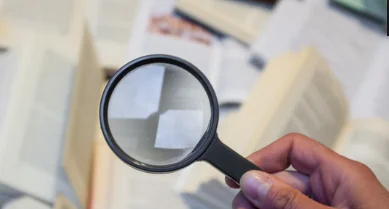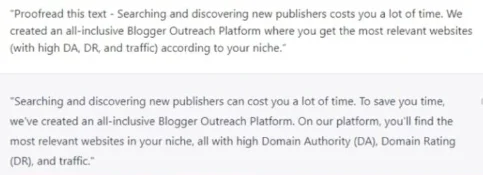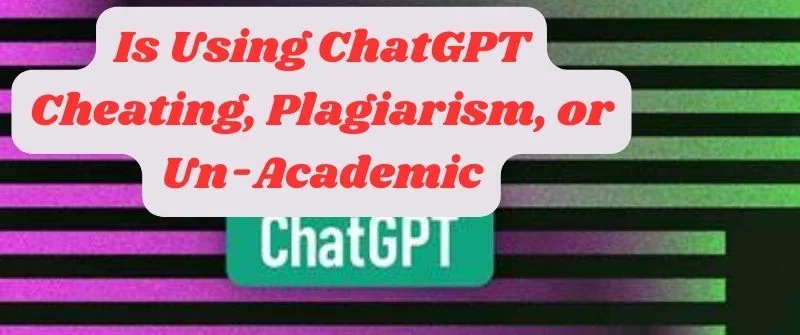As the use of artificial intelligence (AI) writing tools has become rampant, a debate on its application in academic contexts has emerged. Educators, educational institutions, and even students are wondering to what extent the use of AI, such as ChatGPT, should be accepted within the academic context.
Where should we draw the line?
This article focuses on debunking the myths and truths concerning ChatGPT in terms of when it is considered cheating and when it can be acceptable within the academic context.
Is Using ChatGPT Considered Cheating?
The use of AI writing tools such as ChatGPT is very controversial because, on the one hand, it can be considered cheating, while on the other hand, it is acceptable.

If you as a student used ChatGPT to complete assignments or generate answers, then it can be considered plagiarism, cheating, or Un-academic.
This is because it entails the use of external resources to come up with original work that does not attribute the author or the resource or cite them.
It is imperative to observe academic ethics and integrity through the production of original work in addition to properly and adequately citing the resources that have been used in producing the assignment.
More specifically, if you found yourself using ChatGPT to write your essay or do mathematics, you can be regarded as an academic fraud because you have not put personal effort into completing the tasks.
Another way ChatGPT usage can be regarded as cheating is when you use it to generate exam answers. Students are required to study to get the necessary knowledge to pass exams.
Using ChatGPT to get exam answers is academically unethical because you will be using an unfair shortcut to get answers. This encourages academic laziness, whereby you will not study for your exams.
If you do not study, you gain no academic knowledge and will be unqualified for the job market.
Finally, the use of ChatGPT to evade plagiarism scans is considered cheating. AI writing tools generate original responses to questions, meaning their content can easily pass ordinary plagiarism-checking tools that do not have AI detection algorithms. As such, students can use ChatGPT to generate papers and essays that pass originality tests.
However, plagiarism-checking tools such as Canvas and Turnitin have updated their systems in such a way that they can still check for AI-generated content. As such, you should be very careful when using ChatGPT to evade plagiarism scans.
As aforementioned, there are instances when the use of ChatGPT is not considered cheating. If your aim of using the AI model is to aid in the learning process by increasing your insights and knowledge concerning a topic, subject, or discipline, then it is not cheating.
ChatGPT can give a lot of perspectives and information that can help students understand their content more. As long as students effectively and adequately cite the information derived from ChatGPT, then its use can be considered a helpful academic tool.
Students can safely use the AI model to conduct research, proofread their work, suggest content gasps and references, and do revisions.
Instances when Using ChatGPT are Considered Cheating
1. To Write your Essay

As aforementioned, if you use ChatGPT to write your academic essay or paper, you have cheated.
Even though ChatGPT may produce original or unique content in response to the prompts you feed to it, it does not give specific citations to the owners or authors of that information.
As such, if you submit the work without editing and providing citations to the information, you will have committed an academic crime.
Additionally, the content generated by ChatGPT does not belong to you because you have not conducted any research or provided an attribute to the sources. This is considered cheating. As noted, the current plagiarism-checking tools include AI detection in their system. Therefore, you will be caught if you carelessly use ChatGPT to write your essay.
2. To do Math
In most cases, you are not required to cite sources of information like equation sources when solving mathematical problems. Because of this, it may be very difficult for AI to be detected in math.
With ChatGPT, you may generate answers to math problems. However, this is unethical because you are using an unfair means of getting the correct answers without working on them. This is academic cheating.
3. To get Exam Answers
Using ChatGPT to get exam answers is considered cheating because you have not used your knowledge to respond to the answers. Furthermore, you are unfairly using an unauthorized source to get exam answers when other students use acceptable ways of getting answers.
This is considered academic cheating, which is made worse by not providing the sources of your information.
4. Evading Plagiarism Scans

As noted, AI models and writing tools can generate original content easily, passing plagiarism-checking tools. Their content passes similarity scores from outside sources.
Because of this, students may be tempted to use ChatGPT to evade plagiarism scans. This is considered cheating and therefore should be avoided if the student does not know how to use ChatGPT and still evade AI detection effectively.
Instances When Using ChatGPT are Not Considered Cheating
1. To Proofread
Using ChatGPT to proofread cannot be considered cheating because the AI model is only helping the student make corrections before submitting the work they have completed. Humans can make writing errors, and using assistive tools such as AI to correct the errors is not considered a crime.
2. To do Research
ChatGPT can be a valuable resource when you want to conduct research concerning a certain topic or subject. It provides a lot of information that can be used when writing your paper since it utilizes information from multiple sources to come up with appropriate responses. This is not cheating because you will be using ChatGPT like a library.
3. Suggesting Content Gaps
Since ChatGPT is a valuable research tool that generates a lot of appropriate information from multiple sources, it can also be used to suggest content gaps that can help refine your essay or paper. This can be allowed within the academic context because you have not plagiarized anything.
4. To Suggest References
ChatGPT can help in suggesting references for your content. You only need to provide give specific phrases or keywords that are related to your topic. This is not an academic crime because ChatGPT will be helping you locate the appropriate sources of information.
5. To do a Revision
In most cases, revisions are due to proofreading errors, inadequate research, inadequate or lack of proper references, content gaps, and plagiarism. As noted, ChatGPT can help rectify all those issues if used effectively.

Because of this, students can rightfully use ChatGPT to revise the work they had previously submitted.
How to use ChatGPT and get A
You can effectively use ChatGPT to get a good grade and even an A. First, you can use it as a supplement to your learning, whereby it can expound on topics and clarify concepts that are necessary for your essay or paper.
This will indicate that you have understood the assignment, and your instructor may give you an A. Secondly, you can use ChatGPT to provide you will reliable sources of information and help you cite and references them.
By doing so, you will be evading plagiarism, a serious academic crime. Finally, ChatGPT can help in proofreading, researching, suggesting content gaps, and doing revisions. If you use it for such purposes, you will likely get an A.
